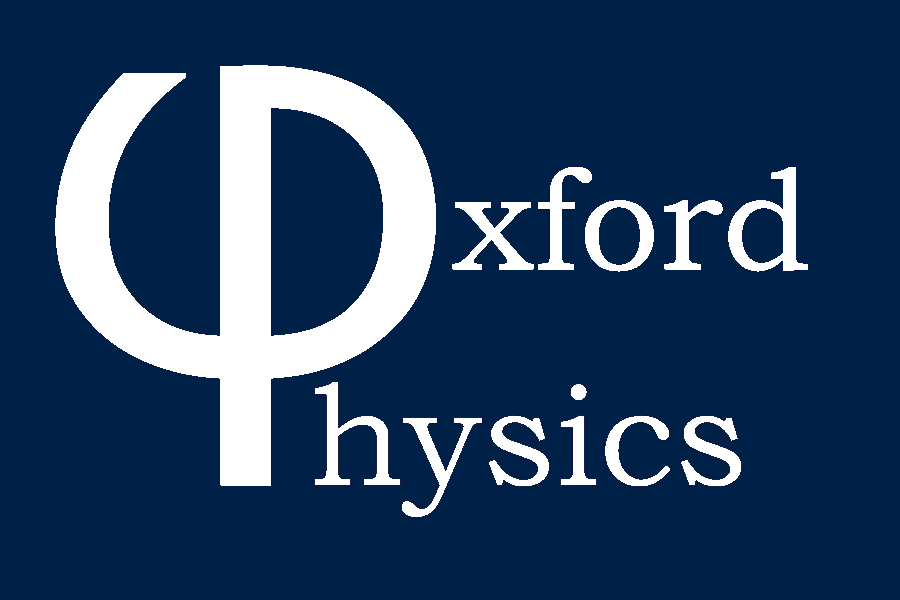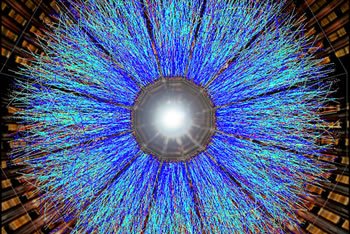Holography Seminar
Time and place: Tue 2-4 pm, Fisher Room, DWB (additional seminars and non-standard time are listed in bold)
Hilary Term 2015 Talks:
- 20/01/2015: No Seminar
- 27/01/2015: Ville Keränen (U. Oxford): Non-equilibrium 2-point functions in AdS/CFT: Formalism and an example
Abstract: We start by discussing correlation functions in quantum field theory and review some formalism for calculating them. Then we move on to discuss the AdS/CFT dictionary in non-equilibrium situations. The two most attractive versions of the dictionary are identified and are shown to be equivalent, for two point correlation functions. Finally, we consider an explicit example of two point correlation functions in a non-equilibrium state in the context of AdS/CFT.
- 03/02/2015: Dmitry Kovrizhin (U.Cambridge): Non-Equilibrium Quantum Matter: From Quantum Hall Edge States to Quantum Spin-Liquids
Abstract: I will talk about non-equilibrium quantum phenomena arising in the context of experimentally relevant condensed matter settings. Examples of the latter include quantum Hall (QHE) edge states driven out of equilibrium by applied bias voltage; and frustrated quantum magnets, where a sudden perturbation can result in an unusual non-equilibrium response. These systems show remarkable behaviour, such as emergence of non-equilibrium steady states, and a dynamical phase diagram, which arise as a result of fractionalization of electron/spin degrees of freedom into quasiparticles (e.g. Majorana fermions and fluxes of gauge field). I will present the theory of electron equilibration in QHE edge states, and discuss dynamical response in quantum spin-liquids.
- 10/02/2015: Ben Craps (U. Brussels): Analytic results on AdS (in)stability: conservation laws and missing secular terms
Abstract: The interest in the nonlinear stability question of the global Anti-de Sitter spacetime (AdS) was raised in 2011 by Bizon and Rostworowski, whose numerical studies suggested that spherically symmetric scalar field perturbations of arbitrarily small amplitude could lead to black hole formation in global AdS, often after many reflections from the AdS boundary. They identified secular growth in weakly nonlinear perturbation theory as responsible for the onset of energy transfer to short-wavelength modes. It was later observed, however, that other initial profiles do not lead to collapse and that some explicit finite deformations of AdS make it stable. This seems to imply a complicated interplay of stable and unstable behavior described by a rich topography in the phase space, which we aim to understand better. Using techniques of multiscale analysis, renormalization and averaging we resum the secular terms that invalidate naive perturbation theory, leading to equations describing the energy flow between modes. Results of this analysis include the absense of most secular terms and the construction of three conserved charges of the flow equations.
- 17/02/2015: No Seminar
- 23/02/2015: Additional seminar: room 501 DWB, 5-7 pm Aleksi Vuorinen (U. Helsinki): Constraining neutron star matter with QCD
Abstract: Next to black holes, the cores of neutron stars are the densest systems known in nature, and as such they provide a unique laboratory for studying the properties of cold and dense nuclear/quark matter. In my talk, I will first review what is known about the properties of such matter based on first principles calculations at low and extremely high densities. Then, I will argue that efficiently combining these insights makes it possible to predict the composition and properties of neutron stars with controllable and rather modest error bars.
- 24/02/2015: Aleksi Vuorinen (U. Helsinki): Dynamics of holographic thermalization at strong and intermediate coupling
Abstract: I will describe recent progress in the holographic description of equilibration dynamics taking place in strongly coupled field theories. In particular, I will pay attention to the impact of finite 't Hooft coupling corrections to the behavior of the system, and argue that qualitative deviations from the infinite coupling limit can be observed at surprisingly large values of the coupling.
- 03/03/2015: Kostas Skenderis (U. Southampton): Conformal field theory in momentum space
Abstract: I will present a first principles analysis of the constraints of conformal invariance in momentum space. In particular, I will derive the form of the 3-point functions of scalar operators, conserved currents and the energy momentum tensor in momentum and discuss renormalization and associated anomalies.
- 10/03/2015: Jerome Gauntlett (Imperial College, London): Holographic Lattices
If you are interested in presenting your research in Oxford, please contact Jonas Probst.
For a list of past talks follow this link.
The following might also be of interest:
- A weekly updated list of talks related to string theory.
- A list of all seminars in the Physics Department, including the Theoretical Physics Colloquium and the Particles and Fields Seminar.

